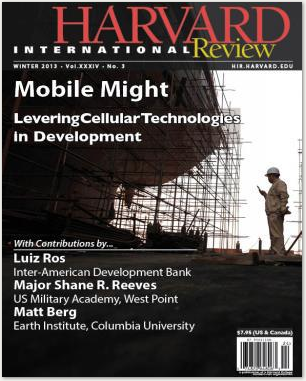“Cellular Citizenship” published in the Harvard International Review

The Harvard International Review’s “Mobile Might” issue for winter 2013 included an essay by the Modi Research Group, highlighting cell phones’ use in data and information systems for smarter development.
The article covers a wide array of topics, from the basics of mobile data collection and real-time planning systems to citizen feedback and “citizen sensors”, from opportunities of geo-spatial analysis to the challenge of finding where people live, and also goes into open data.
The conclusion, followed by a link to the article:
One of the keys to closing the poverty gap is to provide planners with increased access to accurate and up-to-date data that mobile data collection systems are making increasingly possible. Not only are these new approaches more cost-effective and efficient, but they also allow for the use of more sophisticated geospatial-based planning methods. Data sharing has also facilitated increased harmonization between government agencies while strengthening cross-sectoral planning capacity at the local level. Better planning should translate to better investments and hopefully more meaningful impacts on outcomes. Through improved means of verification, not only can communities hold governments and service providers more accountable, but they must also be active participants as service delivery performance becomes increasingly tied to real-time data.


